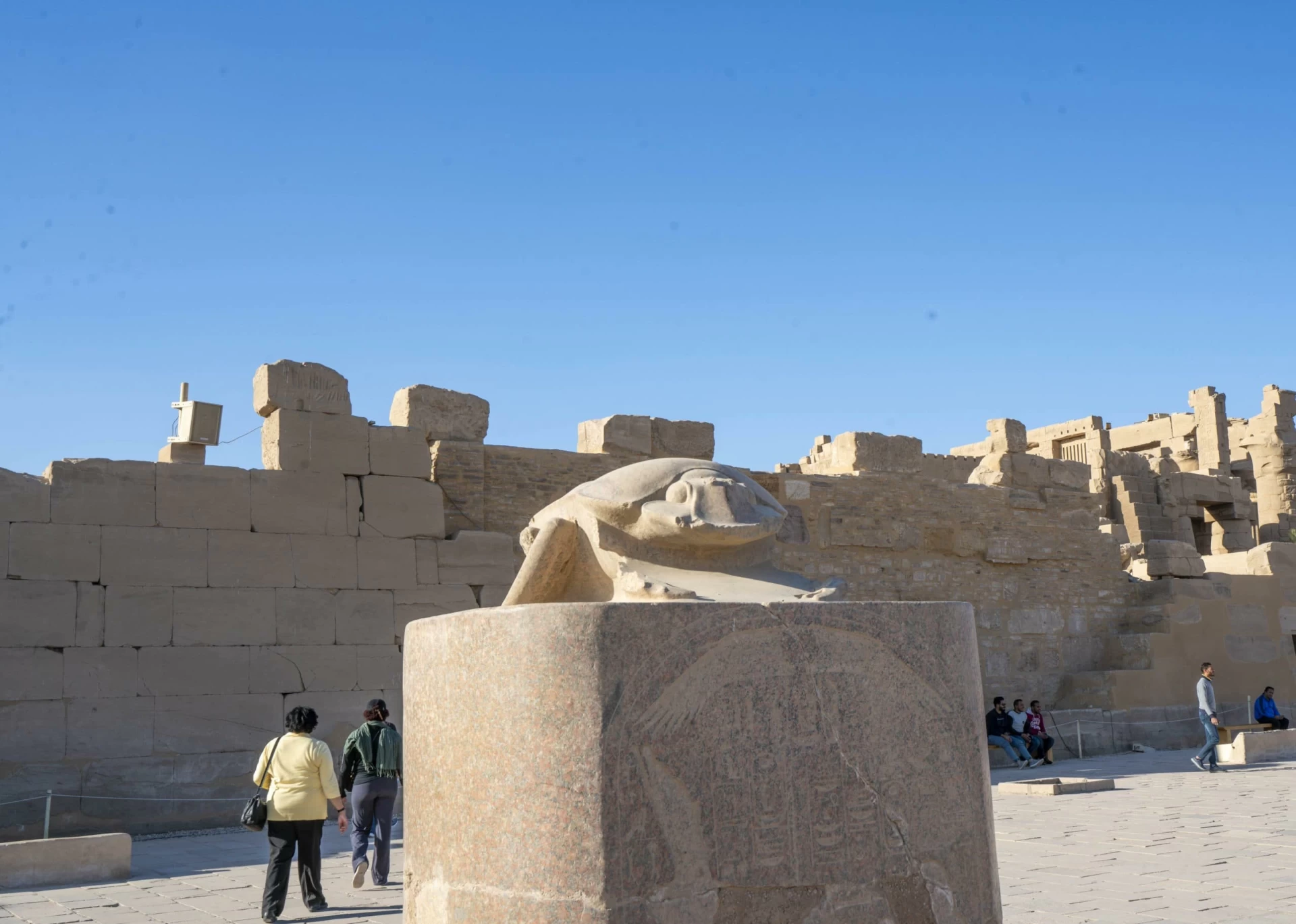Having recently returned from a vacation to Cairo and Luxor, I want to share some practical advice about what to expect when planning a trip to these popular tourist destinations. Despite an uptick in Egypt tourism, they are fantastic though, as you probably know, still a little rough around the edges.
While I picked the hotel and sights to see, we arrived with our entire itinerary prearranged starting from meeting a guide at the Cairo airport before customs and ending with a hotel driver depositing us back at the Cairo airport. We were never unescorted and I do not regret this level of guidance one bit.
In the end, it was a fabulous bucket list experience without a single hiccup.
Use Tour Companies and Hotel Concierges to Arrange Itineraries
I strongly recommend that you also lean on local experts and their resources to guide you from start to finish in Egypt, even though English is common. In fact, I have a hard time recommending that families take on Egypt travel without this kind of assistance.
We used Abercrombie & Kent, who I would highly recommend for a tailor-made itinerary, in addition to guides recommended by Four Seasons Hotel Cairo at The First Residence and hotel drivers. Our itinerary and experience planned by them for our day trip to Luxor from Cairo was outstanding all the way around.
Alternatively, Memphis Tours is another large tour operator (also recommended by Four Seasons) that sells group tours at a lower price point.
Abercrombie & Kent seems to have the most pull. To give you an idea, they secured the front row center for their clients complete with blankets, at the evening Sound & Light show at the pyramids. That’s a nice perk.
To give you even more context, I started planning our Egypt travel with a tour company known for family-friendly itineraries who advertised Cairo as one of their destinations. I waited 10 days for an itinerary whereas Abercrombie & Kent sent me one within 24 hours because they are so dialed in locally and can pull vendors and pricing together quickly whereas the other company was having trouble (I never received an itinerary).
In addition to handling logistics, the other reason for using tour companies and guides is that they do not overlook highlights. On your own, you may pass by significant hieroglyphic scenes and historical facts at temples, in tombs, and elsewhere without knowing it. My husband is an Egypt enthusiast and learned plenty of new tidbits from our guide, much to his surprise. As a tourist, you can also waste a lot of time wandering aimlessly amid these massive temples looking for these highlights. Would I have known to walk around the scrub seven times for good luck at Karnak Temple, for example? Probably not.

The bottom line is that you’ll come out with more knowledge than you would otherwise in a shorter amount of time and without getting lost if you go with an expert.
Buy Your Visa Upon Arrival or Online
We chose to get our Egypt visas at the airport as we were having a Four Seasons representative escort us through customs anyway. If you choose to secure a visa upon arrival, you will need USD 25 per person in cash. There is a staffed visa window (and an ATM machine, but it probably doesn’t dispense USD) right before you get to the customs line.
Alternatively, it’s easy to secure your visa online through the official visa portal.
Arrive With Some Knowledge of Islam
As we were waiting for the Sound & Light show to begin at the pyramids, call to prayer was broadcast in Arabic over a loudspeaker from a nearby temple. A tourist caused quite a scene by bolting out of her seat, clearly afraid, and running to her guide while asking in a panicked voice what was happening. Awkward, yes, but her actions confirmed that people actually do arrive without knowing much about the religion that over 90% of Egyptians practice.
(Call to prayer or the adhan is actually quite beautiful though, even for non-Arabic speakers, if you listen. You’ll hear it five times per day all around Egypt, timed according to the position of the sun and commonly over a loudspeaker.)
I think it’s important, especially when traveling with kids, to appreciate and understand how and why the culture you’re visiting is different from yours. Also, remember that most Egyptians dress conservatively, even in warmer months.
Be Prepared to Go through Multiple Metal Detectors per Day
Security is no joke in Cairo, Luxor, and other parts of Egypt where one must walk through a metal detector and have bags scanned before entering tourist sites, hotels, shopping malls, and more.
On a day of sightseeing, you can easily pass through these checkpoints 10–20 times. You won’t need to remove shoes or pull out liquids, but you’ll want to secure loose items in a zippered handbag or backpack to be sure nothing falls out during the process. In busy tourist spots, trying to locate a cell phone that fell out of a backpack pocket during a security scan would be difficult.
Egyptair Is Fantastic
While we booked EgyptAir business class, which has more benefits than larger seats for those of us who aren’t Star Alliance Gold, our flights departed and arrived pretty close to on time or early and service impressed from start to finish.
A few of our planes were on the newer side as well and the food was pretty good for an airline (it is a dry airline so don’t expect to be served alcohol). We flew EgyptAir to and from Cairo short haul from Europe and again domestically between Luxor and Cairo. Maybe it’s sampling error but we were all really pleased.
You’ll Get Dusty

Sightseeing in Egypt is a dusty business. I made the mistake of wearing athletic shoes that I love and have climbed pyramids in Mexico with. I nearly trashed them with fine dust picked up at pyramids, Valley of the Kings, inside tombs, at temples, in markets, along the streets, and elsewhere.
The dust also kicked up onto our pants so be prepared to pack a few more than usual (socks, too) or to do laundry while on your trip.
I also wear contact lenses. If you do, too, I would advise carrying a moistening solution to wash out dust. Saline nose spray could help those who struggle with allergies.
Unless you’re headed out for a nice hotel restaurant or fine dining experience, leave your fancies (as my husband says) at home.
Carry Lots of Small Bills
At smaller shops and kiosks (of which there are many), even EGP 200 (about USD 11) is too big for small purchases like chips and soda. Our guide in Luxor changed out our EGP 200s for smaller bills when we needed to make small purchases. It is also likely a courtesy to the shop owners as not to wipe out their change drawers.
Small bills will help increase your leverage when negotiating the price in the markets. Also, see below.
You’ll Tip Frequently

If you’re visiting Egypt as a tourist, expect to tip nearly everyone who helps you from the bellman to tour guides to servers in restaurants. In addition, you’ll be asked for tips unexpectedly.
To give you an idea, when touring tombs at Valley of the Kings, a worker will typically follow you into the tombs. At first, we thought it was to supervise which is, of course, fine but ours then proceeded to explain hieroglyphics inside, take photos of us as a family, and undo roped-off areas for us to walk into. A tip afterward is expected (we did see this for what it was immediately but were fine to give small tips for the family photos that I otherwise could not have taken myself).
This happened to us in nearly every Luxor tomb. Guides are unable to accompany tourists inside per regulations designed to move tourists through the tombs quickly (they are small).
When passing a tip to someone in Egypt, do it discreetly. Fold up the bill and pass it to the recipient in a grateful handshake.
Try to Be Patient With the Hustle
Egypt’s economic downturn and currency devaluation has been devastating for many who live there. Stall keepers in tourist sites and markets are at times uncomfortably aggressive with their sales pitches for trinkets. It is annoying but we were mindful that their livelihoods rely on sales and our guides and drivers, I could tell, shared similar sensitivities.
We each ordered small bottles of sparkling water at a temple cafe and were given an unreasonably high bill for them verbally by the server (the manager sorted this out). That was our fault for not clarifying the price upfront but just be aware that the motive to earn is high.
Alcohol Is Limited
Alcohol is avoided by many who practice Islam but is not illegal in Egypt. Many restaurants and cafes do not offer it but you’ll find alcohol in major hotels and for sale in liquor stores (that are not tremendously easy to find).
Most of the alcohol available in Egypt is a limited selection of Egyptian wine or a handful of local beers. Our room service menu had small print indicating that we could ask for imported wine and the hotel restaurants offered cocktail options.
You should also not miss the outstanding fruit juices like mango juice, strawberry juice, and guava juice.
Be Smart With Food

We actually enjoyed some fantastic meals during our time in Egypt by sticking to direction from guides and hotel restaurants. You’ll enjoy a variety of mezze, grilled meats, kushari, desserts, and more. Eating was a pleasure.
Many people experience food poisoning in Egypt, however. If you’re going to be an adventurous eater, take precautions.
Traffic Is Horrible in Cairo and So Is the Driving
Many cars on the roads are dented and scratched for a good reason. One of our drivers told us that the best times to be on the road is between midnight and 6 a.m. because there is always traffic otherwise.
And, the traffic is brutal. Not to mention that drivers pay no mind to lanes. If there are three marked lanes across a road, five cars will jam into them. There is a lot of passing, braking, and honking — sort of like in Delhi.
If you are prone to car sickness, take some medication because the abrupt stop and go could be troublesome for you. You’ll also find yourself needing to depart unusually early for timed attractions because of the need to plan for traffic.
The constant honking also means that your Cairo hotel, most of which bordering streets, will probably have some street noise so bring ear plugs or request a high floor if you’re a light sleeper.
Skip Taxis
Cairo taxis aren’t for the faint of heart. Not only is hailing them a bit of a scrum, but the cars are old and many report a lack of functioning seat belts. I saw plenty and they are not for me.
Instead, turn to your hotel for transportation or use tour providers. Uber also works in Egypt, though we didn’t use it, and we saw a lot of London Cab cars that people rate highly.
Expect Multiple Security Checks at Cairo Airport
Before entering the terminal, guards check passports and you’ll have to walk through a metal detector and put your bags on a scanner.
To get to the check-in counters, you’ll walk through security again, and you’ll have your bags scanned. Here, make sure to carry passports through the metal detector as it will be a huge hassle should you leave them in your bags and send them through the scanner (we learned this the hard way).
If you have boots, they’ll need to be taken off but all other shoes seemed okay. You’ll also need to fill out a departure card given to you at check-in prior to entering Passport Control.
Arrive at your gate a little bit earlier than the time listed on your boarding pass. We had our passports and applicable visas checked by Egyptair staff. Then, everyone passed once again through a metal detector, this time with shoes and belts off. Any liquids need to be in sealed plastic bags and removed from carry-ons. Laptops and iPads were pulled out as well.
Chat up Your Providers
One of the best ways to learn about a country, especially one that is quite different than yours, is to strike up a conversation with whomever you’re with whether it’s your driver, staff delivering your room service (from which we learned interesting tidbits about growing up an Aswan), and whomever else you might spend a few minutes or longer with.
Just when you think you know or have seen everything, they may share an anecdote from their lives that pieces it all together and you’ll come away with more knowledge than you had before. My husband is a conversationalist and this was especially handy in Egypt, especially because our service providers were incredibly gracious.
Register With Your State Department
We were lucky that things were calm enough to enjoy Egypt travel but before you go, check your government’s advisories. United States residents can check with the State Department Egypt travel advisories and register their trip with the closest U.S. Embassy or Consulate through the Smart Traveler Enrollment Program.
Review Your Travel Insurance
When planning a trip to a country like Egypt, it’s important to have your insurance buttoned up.
Look at your current health insurance policy for international coverage. You’ll likely need to supplement it with a travel medical policy that typically comes with other benefits like lost baggage insurance. If you feel nervous about the political climate, add cancel-for-any-reason travel insurance to your policies so that you can change your mind. Two of the best options for this are Allianz (you can use my instant quote service) and Travelex. These two are what high-end travel agents recommend because of the service (huge when it comes to claims), price, and coverage. Just be sure to read all terms and conditions carefully.
In addition to international medical coverage, you may want to look into a MedJet Membership, a medical transport and travel security membership program for travelers. As a family, we have purchased the MedJet Horizon membership for years and have no intention of ever not renewing. If you become hospitalized over 150 miles from home (many families purchase because of sports tournaments kids travel to, kids away at college, and vacation coverage), they will transport you to your hospital of choice.
Egypt Travel Bottom Line
Planning an Egypt vacation takes attention to detail — at least more than I am used to. You shouldn’t wing it especially if you’re traveling with kids. If you’re not the type to travel on preorganized tours talk to Abercrombie and Kent and have them organize an itinerary for you (I can connect you). You may find it’s not as expensive as you think.
People keep asking me is it safe to travel to Egypt. We felt safe because of how we planned the trip, where we stayed, and the stable political climate during our visit. You ultimately need to make this decision based on your own research and feelings.
I will share a complete trip report over multiple posts in the coming weeks.















Leave a Reply